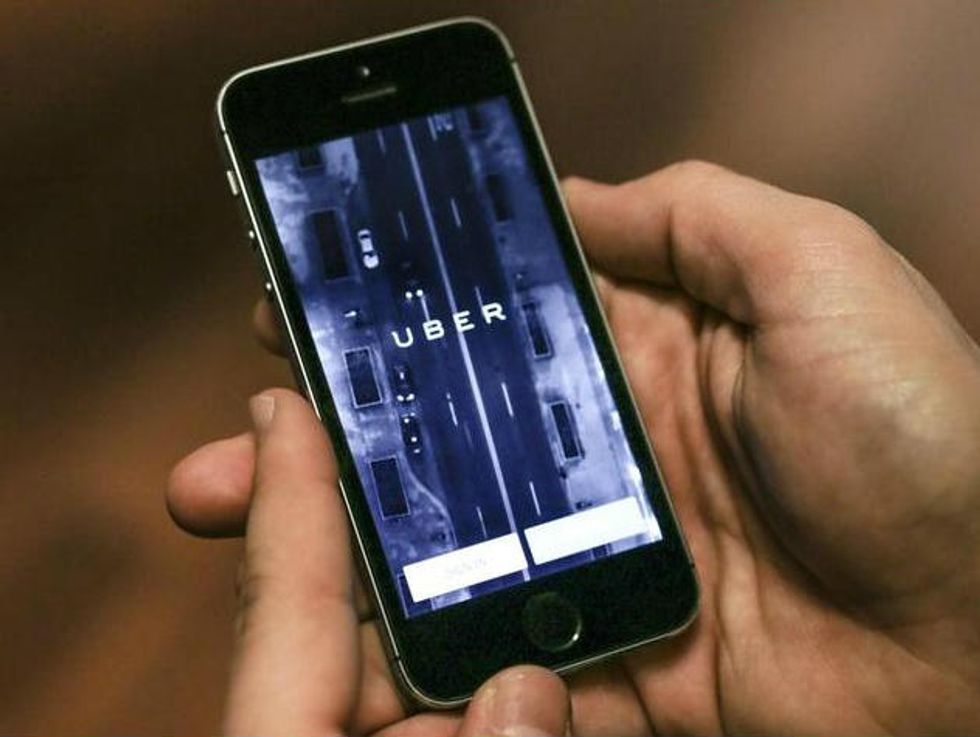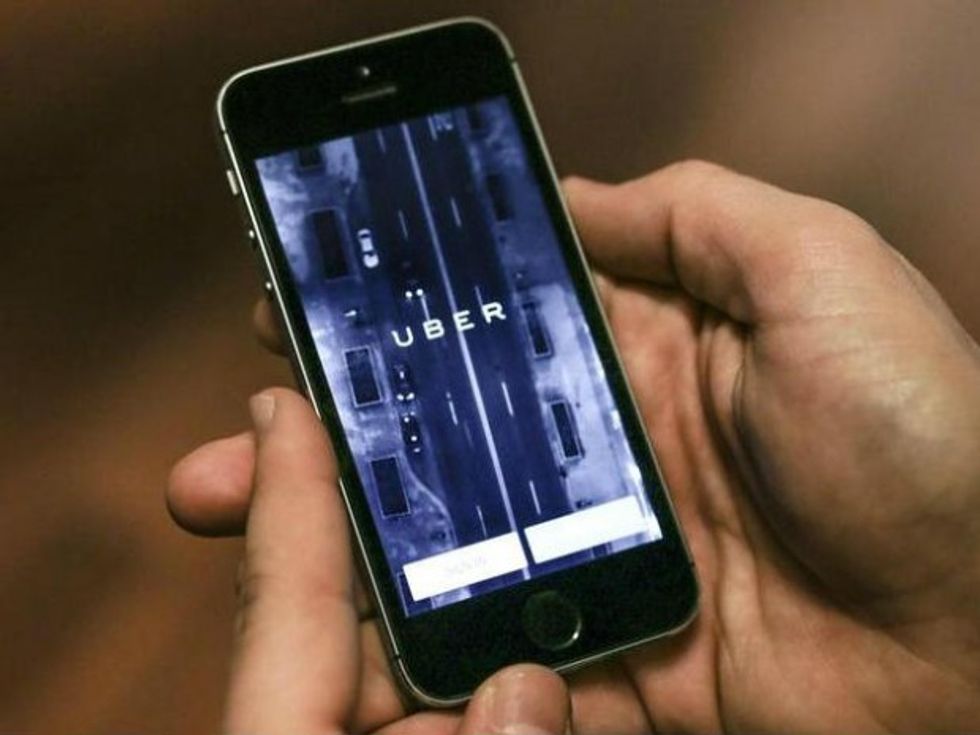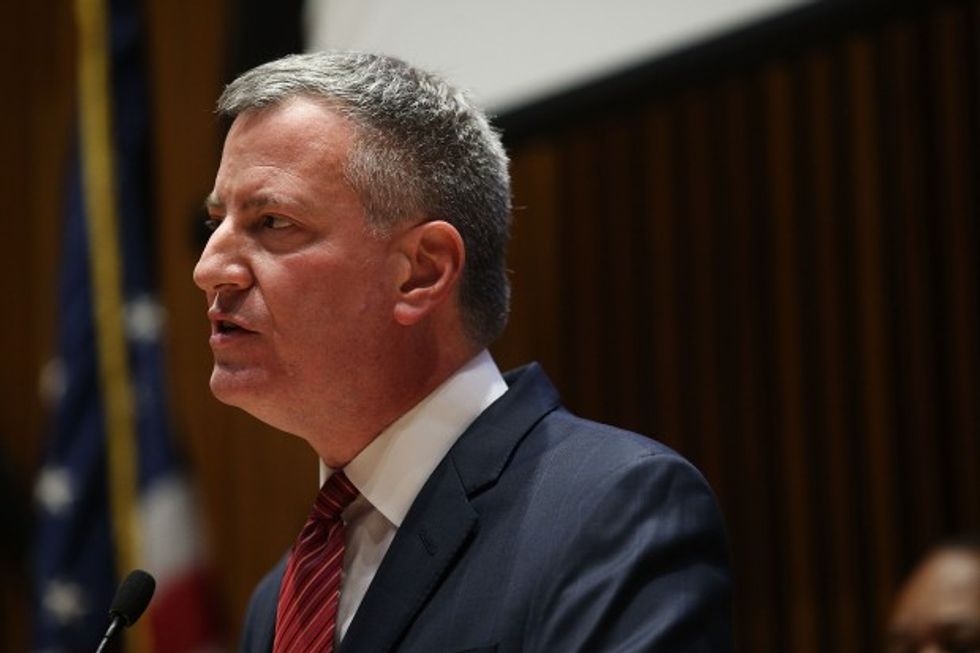Mayor Bill DeBlasio of New York City, a progressive icon, has decided that Uber, the car-hailing app that has exploded in popularity over the past few years, is bad for drivers, bad for consumers and bad for the Big Apple’s notoriously bad traffic.
He claims all this under the red banner of workers’ rights and fairness. Fair to whom, is the more interesting question. While Uber allows its drivers to operate their own vehicles, on their own schedules, the decades-old yellow taxi cartel in New York is up in arms.
 In this Feb. 10, 2015, file photo, Anthony Khoury, head of Middle East and Africa expansions for Uber, demonstrates the mobile application at a press event to celebrate the official launch of the car-hailing service in Cairo. (AP Photo/Mosa'ab Elshamy, File)
In this Feb. 10, 2015, file photo, Anthony Khoury, head of Middle East and Africa expansions for Uber, demonstrates the mobile application at a press event to celebrate the official launch of the car-hailing service in Cairo. (AP Photo/Mosa'ab Elshamy, File)
What he ignores is his own beholden nature to the cab unions and medallion owners who have gotten fat and happy over the years as a city-mandated monopoly insured the value of their investment.
Like all ideologues who propose public policy under the auspices of the greater good, DeBlasio ignores the reality of both the world in 2015 and basic economics. If New Yorkers didn’t like Uber and other similar services, they wouldn’t use them. If Uber drivers were notoriously rude, unhelpful or late, denizens of Gotham could go back to their Yellow Cabs or descend to the Subway to get around.
[sharequote align="center"]DeBlasio’s trying to keep NYC in the 1940s, not the second decade of the second millennium.[/sharequote]
But they’re not doing that – and DeBlasio’s progressive blinders have him trying to keep New York City in a place that more resembles the 1940s than the second decade of the second millennium. This shouldn’t be too surprising an action from a mayor who is single-handedly undoing nearly 30 years of progress in America’s first city.
Rather than take the side of the millions of residents of New York, he has chosen to line up with a strange duopoly – even for a politician. Well-entrenched special interests and those who would commit crimes of public disturbance. Want to urinate in public on a city street? Go ahead! Want to make some extra money for your family? Sorry, no go.
To back up his proposed cap on the number of ride sharing vehicles in the city, DeBlasio in true power-politics fashion has begun warning New York’s business community to stay out of it – threatening them with their own troubles doing business in the city. With actions such as these, he more resembles the don of a local mafia family keeping out unwelcome intruders on his turf than a self-proclaimed “progressive.”
 New York Mayor Bill de Blasio speaks at a news conference at police headquarters to announce new figures on decreasing crime and violence January 5, 2015 in New York City. (Spencer Platt/Getty Images)
New York Mayor Bill de Blasio speaks at a news conference at police headquarters to announce new figures on decreasing crime and violence January 5, 2015 in New York City. (Spencer Platt/Getty Images)
What DeBlasio’s stance on Uber represents is a larger question and concern for the left in America. Uber has created tens of thousands of jobs. It is a darling of Silicon Valley. It represents the future of the service industry – where technology can bring together a customer and a provider and leave both satisfied with the result. Somehow though, Democrats and liberals have decided this isn’t good.
With ad hominem attacks on Uber, comparing them to Wal-Mart or an oil company, DeBlasio and his allies are resorting to a long-established method of ginning up false outrage among their allied special interest groups – attempting to give the impression to the wider world that these new companies are taking the food out of the mouths of someone else.
The taxi industry is old and sclerotic. If Uber had not appeared on the scene four years ago, passengers in major cities like New York, Washington, Los Angeles and San Francisco would still have to suffer from generally awful service at an uncompetitive price.
Based on a monopolistic system first devised early in the 20th century, the taxi industry was ripe for innovation. But it didn’t happen. Why? Because without competition to spur change – positive change for the consumer, the taxi union bosses and medallion owners didn’t really care if their customers were happy. Now offered a cheaper, cleaner, nicer alternative, DeBlasio and his cohorts start screaming about fairness.
When two pillars of the Democratic party – DeBlasio and Hillary Clinton - begin going after new economy companies such as Uber it is a clear sign that their thinking hasn’t kept up with the times. They want growth in the middle class. They want innovation.
But they want progress heavily regulated and often unionized. Uber is anathema to their ideology because it asks nothing, and needs nothing, of government to operate. Indeed, they’re likely as upset that Uber didn’t ask permission before they started operating – a similar reaction we’ve seen in other metropolitan areas as their own taxi monopolies grapple with being superseded by a better, cheaper and more popular service.
Democratic politicians should take note of DeBlasio’s proposals and Uber’s reaction. Despite cutting a deal in California to avoid a worse fate, Uber has fought back directly at the City Council’s proposal – bringing to bear all the modern persuasion tools of a political campaign. Old line companies may going hat-in-hand to blue state and blue city honchos – hoping for the best bad deal – but we shouldn’t expect that reaction from the tech sector.
They are singularly unique in that the things they create on a daily basis – from the iPhone to Uber – would not exist without them. What’s more, their products have fundamentally transformed how Americans live their daily lives. Bill DeBlasio and progressive leaders like him can attempt to stem the flow of new ideas but that wouldn’t be very progressive, would it?
–
TheBlaze contributor channel supports an open discourse on a range of views. The opinions expressed in this channel are solely those of each individual author.


 In this Feb. 10, 2015, file photo, Anthony Khoury, head of Middle East and Africa expansions for Uber, demonstrates the mobile application at a press event to celebrate the official launch of the car-hailing service in Cairo. (AP Photo/Mosa'ab Elshamy, File)
In this Feb. 10, 2015, file photo, Anthony Khoury, head of Middle East and Africa expansions for Uber, demonstrates the mobile application at a press event to celebrate the official launch of the car-hailing service in Cairo. (AP Photo/Mosa'ab Elshamy, File)
 New York Mayor Bill de Blasio speaks at a news conference at police headquarters to announce new figures on decreasing crime and violence January 5, 2015 in New York City. (Spencer Platt/Getty Images)
New York Mayor Bill de Blasio speaks at a news conference at police headquarters to announce new figures on decreasing crime and violence January 5, 2015 in New York City. (Spencer Platt/Getty Images)


